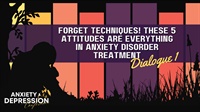- Average Rating:
- Not yet rated
- Topic Areas:
- Dialogues | Anxiety | Strategic Therapy
- Categories:
- Anxiety and Depression Conference 2024
- Faculty:
- Reid Wilson, PhD | Lynn Lyons, LICSW
- Course Levels:
- Master Degree or Higher in Health-Related Field
- Duration:
- 1:00:51
- Format:
- Audio and Video
- Original Program Date:
- Sep 15, 2024
- Short Description:
- This session emphasizes attitude over technique in treating anxiety. Reid Wilson and Lynn Lyons advocate treating anxiety as a mental game, encouraging clients to personify the disorder and focus on emotional patterns rather than specific fears. Core attitudes—like courage, defiance, and tenacity—are key to stepping into discomfort. Strategies include using metaphors, reframing health anxiety as OCD, and distinguishing real problems (signals) from mental noise.
- Price:
- $59.00 - Base Price
- Average Rating:
- Not yet rated
- Topic Areas:
- Dialogues | Communication | Relationships | Resistance
- Categories:
- Anxiety and Depression Conference 2024
- Faculty:
- David Burns, MD | Lilian Borges, MA, LPC
- Course Levels:
- Master Degree or Higher in Health-Related Field
- Duration:
- 1:00:51
- Format:
- Audio and Video
- Original Program Date:
- Sep 15, 2024
- Short Description:
- Resolving conflict does not always require both people to be in the room. In this thoughtful dialogue, David Burns shows how TEAM CBT can be used in individual therapy to address blame, resistance, and stuck interpersonal patterns, using structured tools like the E-A-R checklist and the Five Secrets of communication. Lillian Borges adds an attachment-informed perspective, exploring pursuer-withdrawer dynamics, secure functioning, and practical ways to reduce escalation and restore emotional safety.
- Price:
- $59.00 - Base Price
- Average Rating:
- Not yet rated
- Topic Areas:
- Dialogues
- Categories:
- Anxiety and Depression Conference 2025
- Faculty:
- Lynn Lyons, LICSW | Reid Wilson, PhD
- Course Levels:
- Master Degree or Higher in Health-Related Field
- Duration:
- 1:01:48
- Format:
- Audio and Video
- Original Program Date:
- Sep 28, 2025
- Short Description:
- Lynn Lyons and Dr. Reid Wilson have been treating anxiety and OCD for decades. They’ve written books (together and separately), trained clinicians (together and separately) and are full of observations and opinions about what works, what doesn’t, and where anxiety treatment is going. In this dialogue, Lynn and Reid will ask each other pointed questions about trends, success, failures, changes, and controversies. And the audience is invited to join in with their own questions.
- Price:
- $59.00 - Base Price
- Average Rating:
- Not yet rated
- Topic Areas:
- Dialogues
- Categories:
- Anxiety and Depression Conference 2025
- Faculty:
- Lilian Borges, MA, LPC | Dan Short, PhD
- Course Levels:
- Master Degree or Higher in Health-Related Field
- Duration:
- 48:49
- Format:
- Audio and Video
- Original Program Date:
- Sep 28, 2025
- Short Description:
- Join two experienced Ericksonian therapists as they discuss innovative, client-centered strategies for addressing anxiety and depression. This dialogue explores how hypnotic techniques can align with evidence-based practices, enhance client autonomy, and reframe emotional conflict. Practical examples highlight the nuanced use of language, pacing, and suggestion in therapeutic conversations. This dialogue doesn't require previous knowledge about hypnosis. It will enhance the knowledge of professionals who use hypnosis in their practice as well as those who don't.
- Price:
- $59.00 - Base Price
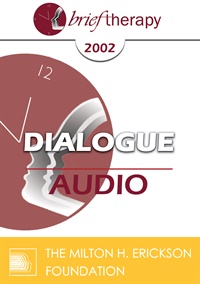
- Average Rating:
- Not yet rated
- Topic Areas:
- Dialogues | Couples Therapy | Cognitive Behavior Therapy (CBT) | Solution Oriented Approach | Communication
- Categories:
- Brief Therapy Conference | Brief Therapy Conference 2002 | Pioneers in Couples and Family Therapy
- Faculty:
- Arthur Freeman, EdD | Michele Weiner-Davis, LCSW
- Duration:
- 1:01:29
- Format:
- Audio Only
- Original Program Date:
- Dec 13, 2002
- Short Description:
- Two brief therapy models—cognitive-behavioral and solution-focused—are explored for their ability to jump-start change in distressed couples. The presenters consider how early signs of improvement, hope-building, and collaborative strategies support movement toward repair. The conversation also addresses clinical judgment around domestic violence, therapist alignment, and working within complex systems.
- Price:
- $15.00 - Base Price
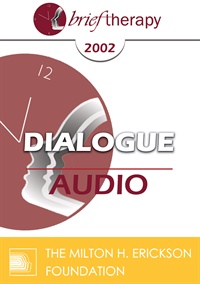
- Average Rating:
- Not yet rated
- Topic Areas:
- Dialogues | Utilization | Brief Therapy | Ericksonian Hypnosis and Therapy Techniques | Hypnosis | Trance
- Categories:
- Brief Therapy Conference | Brief Therapy Conference 2002
- Faculty:
- Steve De Shazer, MSSW | Betty Alice Erickson, MS, LPC, LMFT
- Duration:
- 58:56
- Format:
- Audio Only
- Original Program Date:
- Dec 13, 2002
- Short Description:
- In this interactive dialogue, colleagues explore utilization as the art of using whatever the client brings, including symptoms, resistance, and even “learned helplessness,” as potential resources for change. Through stories, clinical examples, and audience questions, they examine client strengths, naturalistic trance, responsibility, and the fine line between guiding and imposing. The conversation offers a practical, nuanced look at how therapists can transform everyday patterns into openings for growth.
- Price:
- $15.00 - Base Price
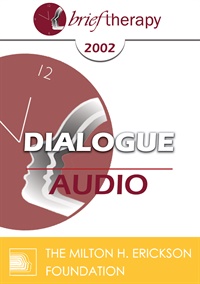
- Average Rating:
- Not yet rated
- Topic Areas:
- Dialogues | Brief Therapy
- Categories:
- Brief Therapy Conference | Brief Therapy Conference 2002
- Faculty:
- Jon Carlson | Albert Ellis, PhD
- Duration:
- 58 Minutes
- Format:
- Audio Only
- Original Program Date:
- Dec 13, 2002
- Short Description:
- BT02 Dialogue 05 - Active-Directive Approaches to Brief Therapy - Jon Carlson, PsyD, EdD and Albert Ellis, PhD
- Price:
- $15.00 - Base Price
Tags: Brief Therapy Albert Ellis
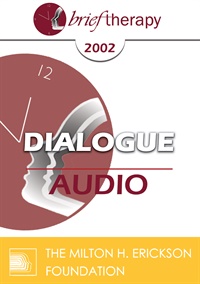
- Average Rating:
- Not yet rated
- Topic Areas:
- Dialogues | Depression | Brief Therapy | Anxiety
- Categories:
- Brief Therapy Conference | Brief Therapy Conference 2002
- Faculty:
- Reid Wilson, PhD | Michael Yapko, PhD
- Duration:
- 55:12
- Format:
- Audio Only
- Original Program Date:
- Dec 13, 2002
- Short Description:
- This dialogue explores the intersection of anxiety and depression, emphasizing the need to assess and treat both conditions together. Key topics include simple screening tools recommended by the Agency for Healthcare Quality and Research, rising depression rates, and the role of psychoeducation and hypnosis in treatment. A case study highlights how addressing depression can lead to meaningful improvements in anxiety symptoms.
- Price:
- $15.00 - Base Price
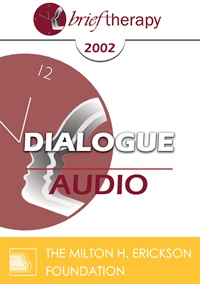
- Average Rating:
- Not yet rated
- Topic Areas:
- Dialogues | Love | Relationships | Brief Therapy | Communication
- Categories:
- Brief Therapy Conference | Brief Therapy Conference 2002
- Faculty:
- Insoo Kim Berg, MSSW
- Duration:
- 1:00:54
- Format:
- Audio Only
- Original Program Date:
- Dec 13, 2002
- Short Description:
- What actually creates change in love relationships? In this lively dialogue, Berg and Love compare solution-focused and neurobiological perspectives on couples work. Through case examples and audience consultation, they explore how hope, small behavioral shifts, expectation, and brain science intersect in real clinical practice. The conversation offers practical ways to interrupt stuck patterns and help partners become healing agents for one another.
- Price:
- $15.00 - Base Price

- Average Rating:
- Not yet rated
- Topic Areas:
- Dialogues | Brief Therapy | Research
- Categories:
- Brief Therapy Conference | Brief Therapy Conference 2002
- Faculty:
- Scott Miller, PhD | James Prochaska, PhD
- Duration:
- 58:14
- Format:
- Audio Only
- Original Program Date:
- Dec 13, 2002
- Short Description:
- BT02 Dialogue 10 - Research in Brief Therapy - Scott Miller, PhD and James Prochaska, PhD
- Price:
- $15.00 - Base Price
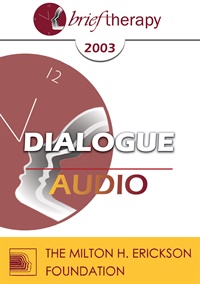
- Average Rating:
- Not yet rated
- Topic Areas:
- Dialogues | Brief Therapy | Self-Care | Therapist Development
- Categories:
- Brief Therapy Conference | Brief Therapy Conference 2003
- Faculty:
- Mary Goulding, MSW | John C. Norcross, PhD
- Duration:
- 52:52
- Format:
- Audio Only
- Original Program Date:
- Dec 12, 2003
- Short Description:
- BT03 Dialogue 01 - Therapist Self-Care - Mary Goulding, MSW, John Norcross, PhD
- Price:
- $15.00 - Base Price
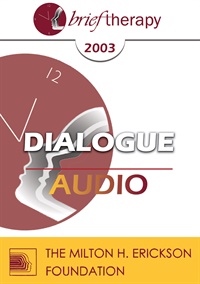
- Average Rating:
- Not yet rated
- Topic Areas:
- Dialogues | Brief Therapy
- Categories:
- Brief Therapy Conference | Brief Therapy Conference 2003
- Faculty:
- Robert Dilts, BA | Stephen Gilligan, PhD
- Duration:
- 53:18
- Format:
- Audio Only
- Original Program Date:
- Dec 12, 2003
- Short Description:
- Educational Objective: To become aware of the differing approaches to brief therapy and to describe the strengths and weaknesses in each approach.
- Price:
- $15.00 - Base Price
Tags: Brief Therapy
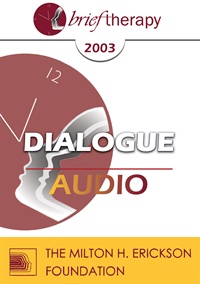
- Average Rating:
- Not yet rated
- Topic Areas:
- Dialogues | Brief Therapy | Therapist Development
- Categories:
- Brief Therapy Conference | Brief Therapy Conference 2003
- Faculty:
- Jon Carlson | William Glasser, MD
- Duration:
- 53:18
- Format:
- Audio Only
- Original Program Date:
- Dec 12, 2003
- Short Description:
- Educational Objectives: To become aware of the differing approaches to brief therapy and to describe the strengths and weaknesses in each approach.
- Price:
- $15.00 - Base Price
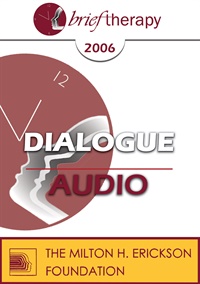
- Average Rating:
- Not yet rated
- Topic Areas:
- Dialogues | Metaphors | Brief Therapy | Ericksonian Hypnosis and Therapy Techniques
- Categories:
- Brief Therapy Conference | Brief Therapy Conference 2006
- Faculty:
- Jeffrey Kottler, PhD | Stephen Lankton, MSW
- Duration:
- 59:20
- Format:
- Audio Only
- Original Program Date:
- Dec 08, 2006
- Short Description:
- BT06 Dialog 02 - Metaphor - Jeffrey Kottler, PhD & Stephen Lankton, MSW, DAHB
- Price:
- $15.00 - Base Price
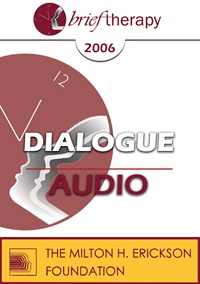
- Average Rating:
- Not yet rated
- Topic Areas:
- Dialogues | Brief Therapy | Neuroscience
- Categories:
- Brief Therapy Conference | Brief Therapy Conference 2006
- Faculty:
- Pat Love, EdD | Ernest Rossi, PhD
- Duration:
- 1:01:43
- Format:
- Audio Only
- Original Program Date:
- Dec 08, 2006
- Short Description:
- BT06 Dialogue 03 - Role of Neurophysiology in Brief Therapy - Pat Love, EdD and Ernest Rossi, PhD
- Price:
- $15.00 - Base Price
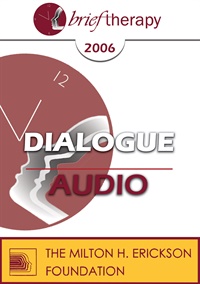
- Average Rating:
- Not yet rated
- Topic Areas:
- Dialogues | Brief Therapy | Sex and Sexuality
- Categories:
- Brief Therapy Conference | Brief Therapy Conference 2006 | Pioneers in Couples and Family Therapy
- Faculty:
- Michele Weiner-Davis, LCSW | Jeffrey Zeig, PhD
- Duration:
- 59:19
- Format:
- Audio Only
- Original Program Date:
- Dec 08, 2006
- Short Description:
- This session explores clinical strategies for working with desire differences in couples, including common patterns like mismatched libido and anxiety-related avoidance. The presenters discuss the shift from spontaneous to responsive arousal with age, the role of hypnosis and psychoeducation, and the importance of helping couples maintain connection, adapt expectations, and approach sex as a collaborative process.
- Price:
- $15.00 - Base Price
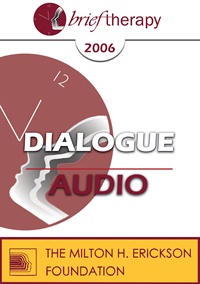
- Average Rating:
- Not yet rated
- Topic Areas:
- Dialogues | Multicultural | Brief Therapy
- Categories:
- Brief Therapy Conference | Brief Therapy Conference 2006
- Faculty:
- Kenneth Hardy, PhD | Monica McGoldrick, PhD
- Duration:
- 1:05:46
- Format:
- Audio Only
- Original Program Date:
- Dec 08, 2006
- Short Description:
- BT06 Dialogue 05 - Multicultural Therapy - Kenneth Hardy, PhD & Monica McGoldrick, M.A., LCSW
- Price:
- $15.00 - Base Price
Tags: Brief Therapy Multi-Cultural

- Average Rating:
- Not yet rated
- Topic Areas:
- Dialogues | Hypnosis | Ethical Practice | Pain and Healing
- Categories:
- Brief Therapy Conference | Brief Therapy Conference 2006
- Faculty:
- Betty Alice Erickson, MS, LPC, LMFT | Michael Yapko, PhD
- Duration:
- 1:06:50
- Format:
- Audio Only
- Original Program Date:
- Dec 08, 2006
- Short Description:
- This session explores the paradox of hypnosis as both exaggerated and overlooked in clinical practice. Erickson and Yapko discuss myths, misuse, and misconceptions, while highlighting hypnosis as an adjunct that enhances therapy rather than replaces it. Participants gain a balanced understanding of hypnosis as a mainstream, evidence-supported tool, with unique value in pain management and experiential change.
- Price:
- $15.00 - Base Price
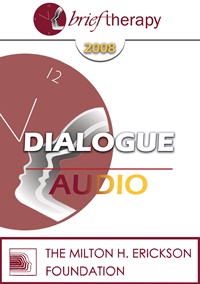
- Average Rating:
- Not yet rated
- Topic Areas:
- Dialogues | Children and Adolescent Therapy | Brief Therapy
- Categories:
- Brief Therapy Conference | Brief Therapy Conference 2008
- Faculty:
- Kenneth Hardy, PhD | Matthew Selekman, MSW
- Duration:
- 1:00:44
- Format:
- Audio Only
- Original Program Date:
- Dec 13, 2008
- Short Description:
- BT08 Dialogue 01 - Therapy with Challenging Children - Kenneth V. Hardy, PhD, Matthew Selekman, MSW
- Price:
- $15.00 - Base Price
Tags: Adolescents Brief Therapy Children
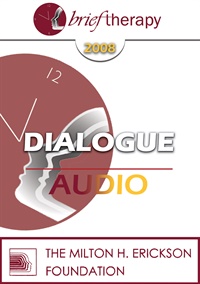
- Average Rating:
- Not yet rated
- Topic Areas:
- Dialogues | Brief Therapy | Meditation, Spirituality and Yoga | Psychotherapy | Therapist Development
- Categories:
- Brief Therapy Conference | Brief Therapy Conference 2008
- Faculty:
- Steven Hayes, PhD | James Prochaska, PhD
- Duration:
- 1:02:15
- Format:
- Audio Only
- Original Program Date:
- Dec 13, 2008
- Short Description:
- BT08 Dialogue 02 - Science, Practice and Spirituality Issues - Steven Hayes, PhD, James Prochaska, PhD
- Price:
- $15.00 - Base Price
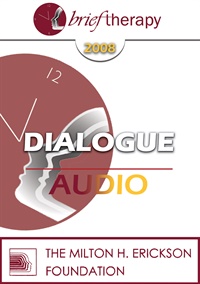
- Average Rating:
- Not yet rated
- Topic Areas:
- Dialogues | Brief Therapy | Therapist Development
- Categories:
- Brief Therapy Conference | Brief Therapy Conference 2008
- Faculty:
- Jeffrey Kottler, PhD | Scott Miller, PhD
- Duration:
- 59:10
- Format:
- Audio Only
- Original Program Date:
- Dec 13, 2008
- Short Description:
- BT08 Dialogue 03 - Limits of Brief Therapy - Jeffrey Kottler, PhD, Scott Miller, PhD
- Price:
- $15.00 - Base Price
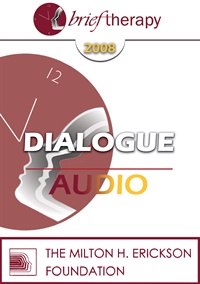
- Average Rating:
- Not yet rated
- Topic Areas:
- Dialogues | Anxiety | Depression | Group Therapy
- Categories:
- Brief Therapy Conference | Brief Therapy Conference 2008
- Faculty:
- Erving Polster, PhD | Michael Yapko, PhD
- Duration:
- 58:43
- Format:
- Audio Only
- Original Program Date:
- Dec 13, 2008
- Short Description:
- This dialogue explores depression as a disorder of perspective, shaped more by coping style and social context than by biology alone. Emphasizing the dangers of rumination, passivity, and isolation, it highlights how therapy can teach clients proactive problem-solving, expectancy, and social skills. The workshop also critiques medication culture, addressing issues from ghostwritten studies and overprescription to ecological concerns. Participants gain practical strategies for building resilience and preventing relapse, while situating depression within a broader cultural and relational framework .
- Price:
- $15.00 - Base Price
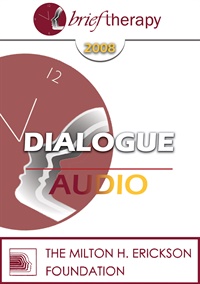
- Average Rating:
- Not yet rated
- Topic Areas:
- Dialogues | Belief Systems | Brief Therapy | Therapist Development
- Categories:
- Brief Therapy Conference | Brief Therapy Conference 2008
- Faculty:
- Steve Andreas, MA, NLP | Robert Dilts, BA
- Duration:
- 56:51
- Format:
- Audio Only
- Original Program Date:
- Dec 13, 2008
- Short Description:
- This dialogue takes a practical, down-to-earth look at how beliefs form, harden, and quietly shape emotional life. Through conversation and live demonstration, it shows how widening context and perspective can soften rigid inner voices and create more room for choice.
- Price:
- $15.00 - Base Price
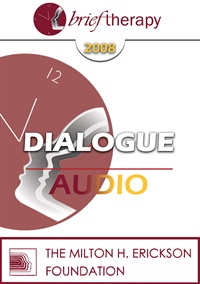
- Average Rating:
- Not yet rated
- Topic Areas:
- Dialogues | Brief Therapy | Psychotherapy | Therapist Development
- Categories:
- Brief Therapy Conference | Brief Therapy Conference 2008
- Faculty:
- Peter Levine, PhD | John C. Norcross, PhD
- Duration:
- 58:33
- Format:
- Audio Only
- Original Program Date:
- Dec 13, 2008
- Short Description:
- BT08 Dialogue 06 - The Psychotherapist's Personal Therapy - Peter Levine, PhD, John Norcross, PhD
- Price:
- $15.00 - Base Price
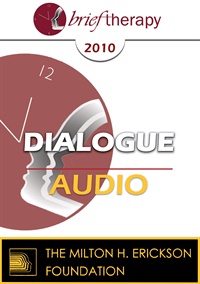
- Average Rating:
- Not yet rated
- Topic Areas:
- Dialogues | Brief Therapy
- Categories:
- Brief Therapy Conference | Brief Therapy Conference 2010
- Faculty:
- Donald Meichenbaum, PhD | Scott Miller, PhD
- Duration:
- 59:03
- Format:
- Audio Only
- Original Program Date:
- Dec 11, 2010
- Short Description:
- BT10 Dialogue 01 - Evidence-Based Therapies versus A Common Factors Approach: A Way Forward - Donald Meichenbaum, PhD, Scott Miller, PhD Evidence based therapies versus a "common factors" approach dialogue featuring Donald Meichenbaum and Scott Miller.
- Price:
- $15.00 - Base Price
Tags: Brief Therapy


